NHS Charging for Self-Inflicted Injuries
VerifiedAdded on 2020/06/04
|12
|2623
|121
AI Summary
This assignment tasks students with critically examining the controversial topic of charging the NHS for treatment of self-inflicted injuries. It requires students to research and present both sides of the argument, considering ethical dilemmas, potential societal impacts, and economic factors. Students are expected to synthesize their findings into a well-structured essay that clearly articulates their stance on this complex issue.
Contribute Materials
Your contribution can guide someone’s learning journey. Share your
documents today.
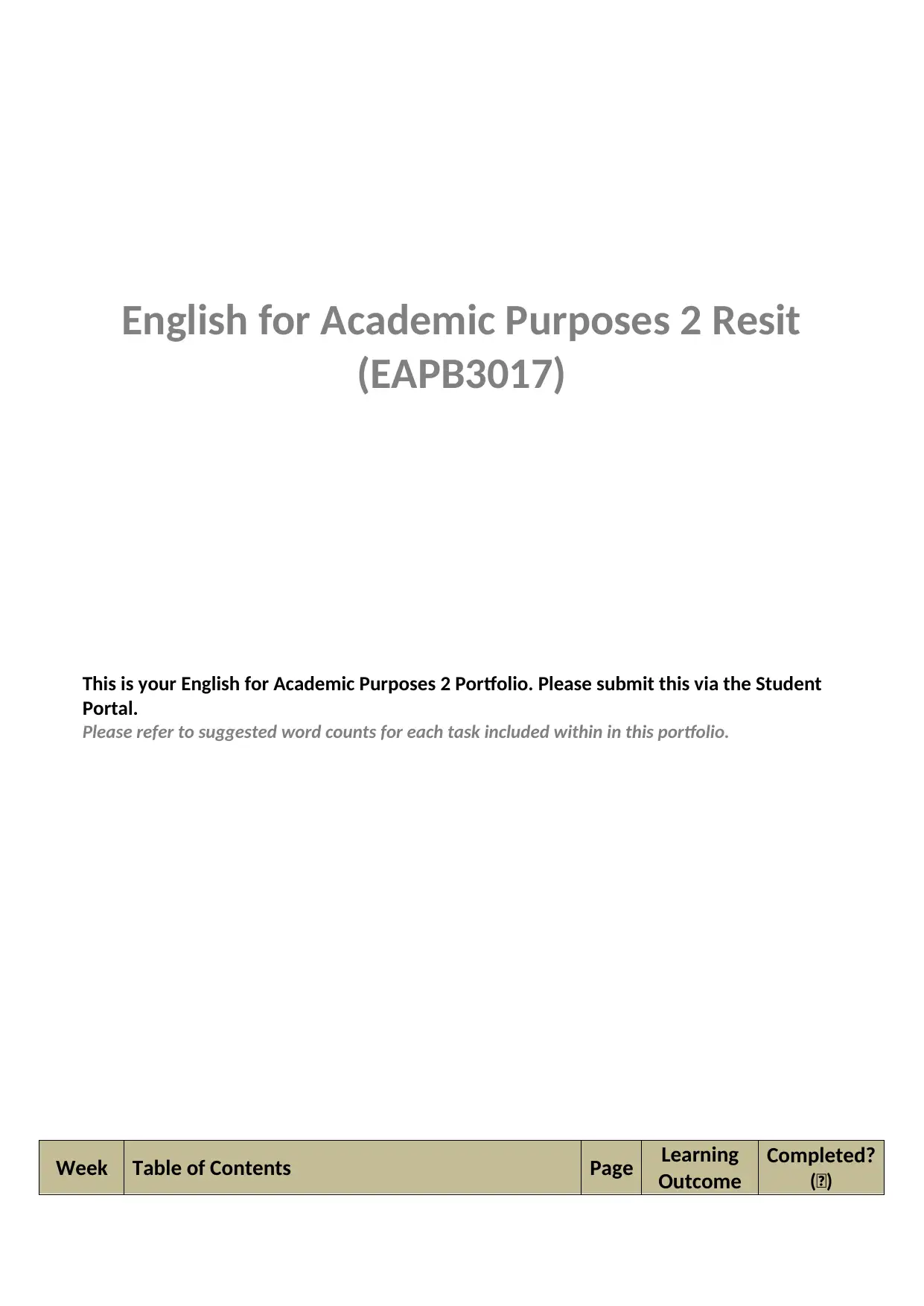
English for Academic Purposes 2 Resit
(EAPB3017)
This is your English for Academic Purposes 2 Portfolio. Please submit this via the Student
Portal.
Please refer to suggested word counts for each task included within in this portfolio.
Week Table of Contents Page Learning
Outcome
Completed?
()
(EAPB3017)
This is your English for Academic Purposes 2 Portfolio. Please submit this via the Student
Portal.
Please refer to suggested word counts for each task included within in this portfolio.
Week Table of Contents Page Learning
Outcome
Completed?
()
Secure Best Marks with AI Grader
Need help grading? Try our AI Grader for instant feedback on your assignments.
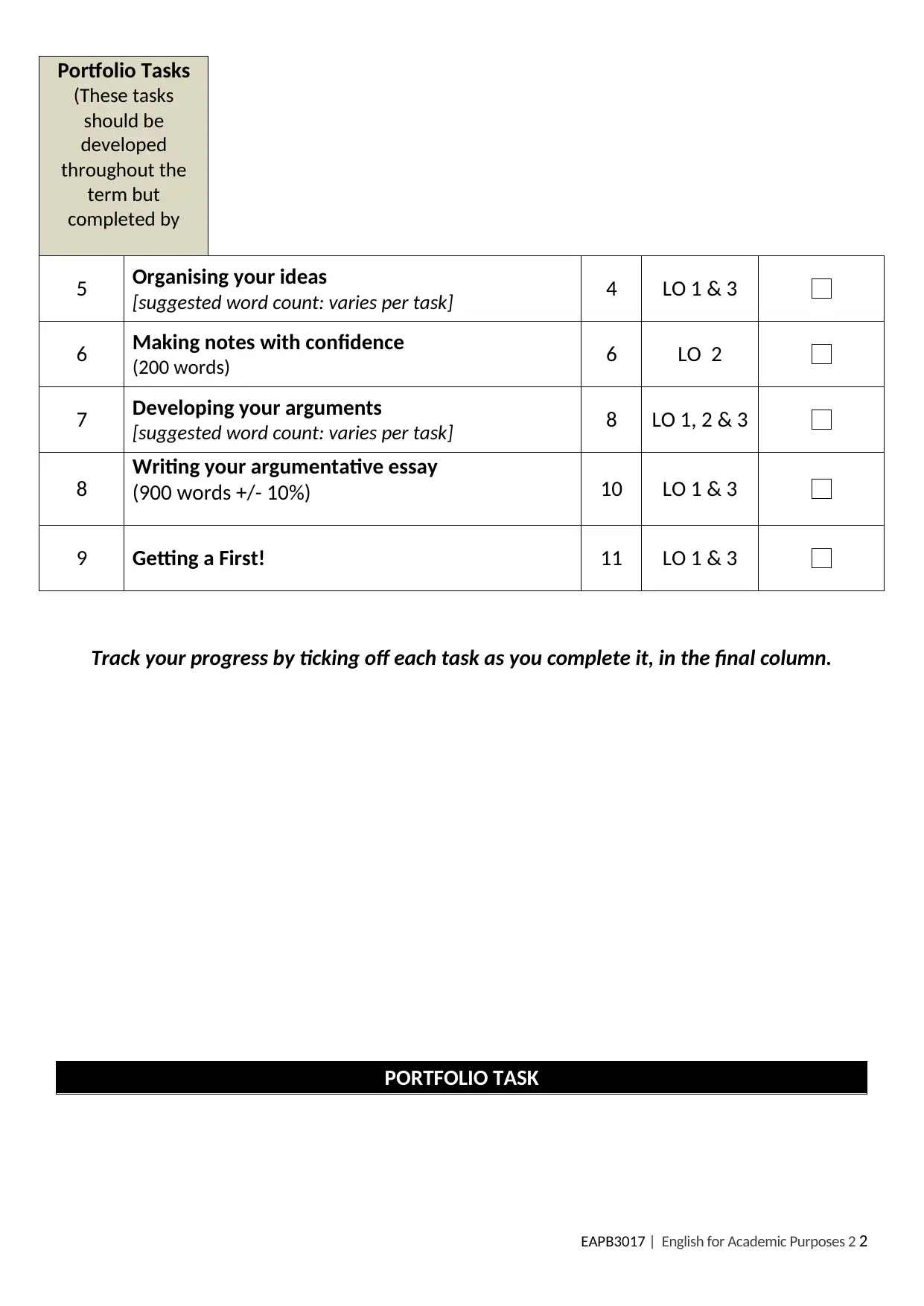
Portfolio Tasks
(These tasks
should be
developed
throughout the
term but
completed by
5 Organising your ideas
[suggested word count: varies per task] 4 LO 1 & 3
6 Making notes with confidence
(200 words) 6 LO 2
7 Developing your arguments
[suggested word count: varies per task] 8 LO 1, 2 & 3
8
Writing your argumentative essay
(900 words +/- 10%) 10 LO 1 & 3
9 Getting a First! 11 LO 1 & 3
Track your progress by ticking off each task as you complete it, in the final column.
PORTFOLIO TASK
EAPB3017 | English for Academic Purposes 2 2
(These tasks
should be
developed
throughout the
term but
completed by
5 Organising your ideas
[suggested word count: varies per task] 4 LO 1 & 3
6 Making notes with confidence
(200 words) 6 LO 2
7 Developing your arguments
[suggested word count: varies per task] 8 LO 1, 2 & 3
8
Writing your argumentative essay
(900 words +/- 10%) 10 LO 1 & 3
9 Getting a First! 11 LO 1 & 3
Track your progress by ticking off each task as you complete it, in the final column.
PORTFOLIO TASK
EAPB3017 | English for Academic Purposes 2 2

Organising your ideas: Are my sources reliable?
EAPB3017 | English for Academic Purposes 2 3
EAPB3017 | English for Academic Purposes 2 3
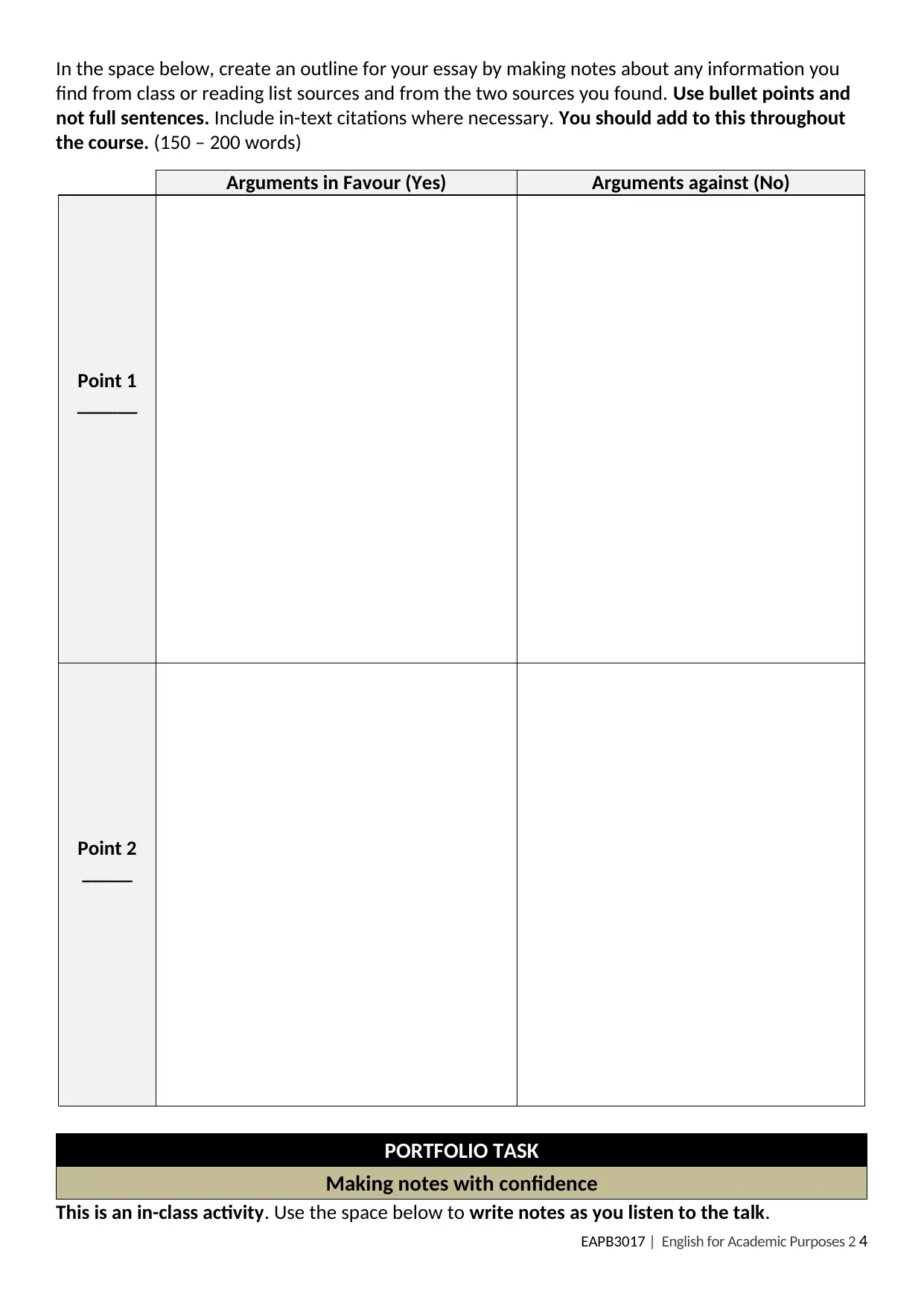
In the space below, create an outline for your essay by making notes about any information you
find from class or reading list sources and from the two sources you found. Use bullet points and
not full sentences. Include in-text citations where necessary. You should add to this throughout
the course. (150 – 200 words)
Arguments in Favour (Yes) Arguments against (No)
Point 1
______
Point 2
_____
PORTFOLIO TASK
Making notes with confidence
This is an in-class activity. Use the space below to write notes as you listen to the talk.
EAPB3017 | English for Academic Purposes 2 4
find from class or reading list sources and from the two sources you found. Use bullet points and
not full sentences. Include in-text citations where necessary. You should add to this throughout
the course. (150 – 200 words)
Arguments in Favour (Yes) Arguments against (No)
Point 1
______
Point 2
_____
PORTFOLIO TASK
Making notes with confidence
This is an in-class activity. Use the space below to write notes as you listen to the talk.
EAPB3017 | English for Academic Purposes 2 4
Secure Best Marks with AI Grader
Need help grading? Try our AI Grader for instant feedback on your assignments.

Write a summary about what you have just listened to. (no more than 100 words)
EAPB3017 | English for Academic Purposes 2 5
EAPB3017 | English for Academic Purposes 2 5
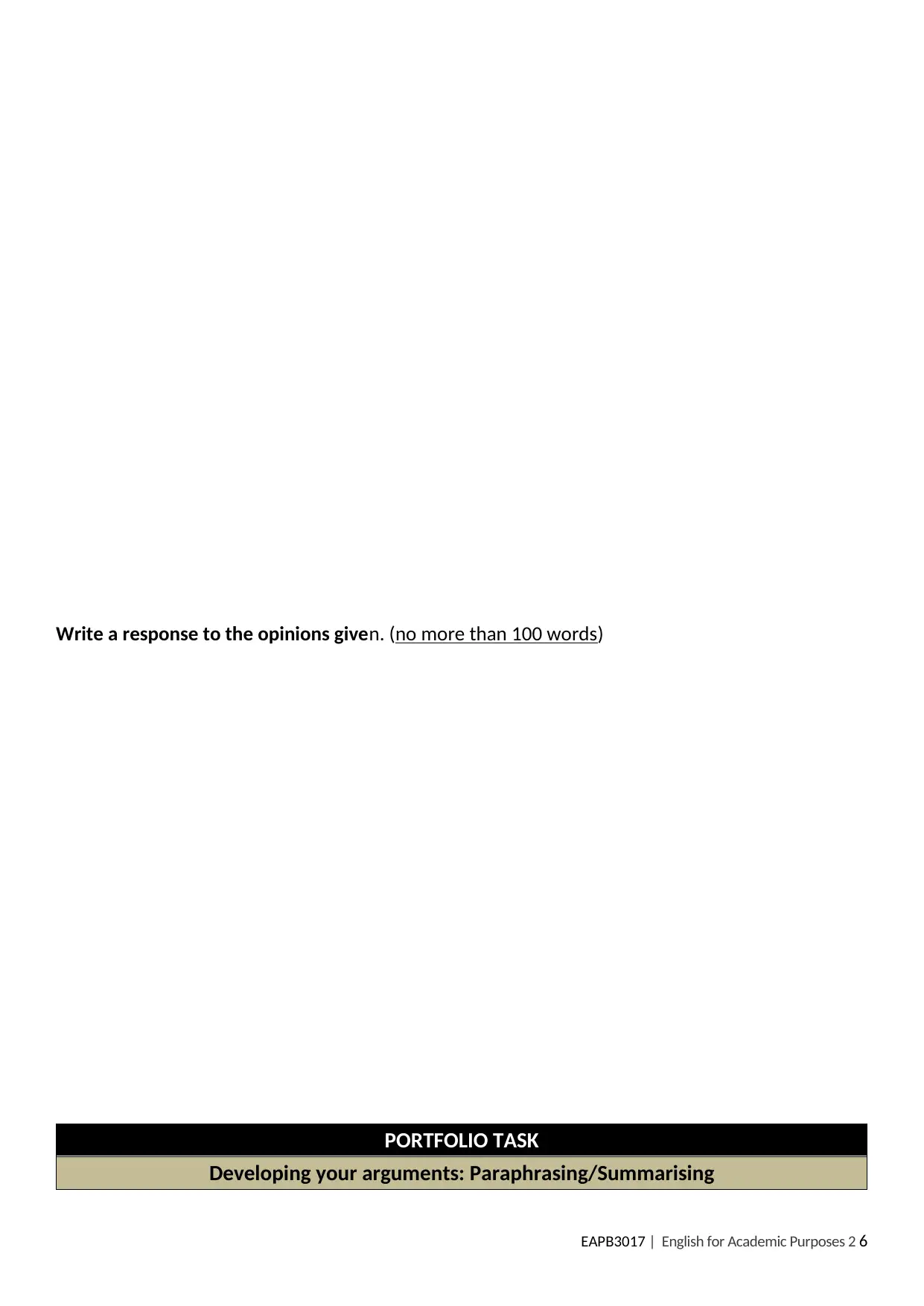
Write a response to the opinions given. (no more than 100 words)
PORTFOLIO TASK
Developing your arguments: Paraphrasing/Summarising
EAPB3017 | English for Academic Purposes 2 6
PORTFOLIO TASK
Developing your arguments: Paraphrasing/Summarising
EAPB3017 | English for Academic Purposes 2 6
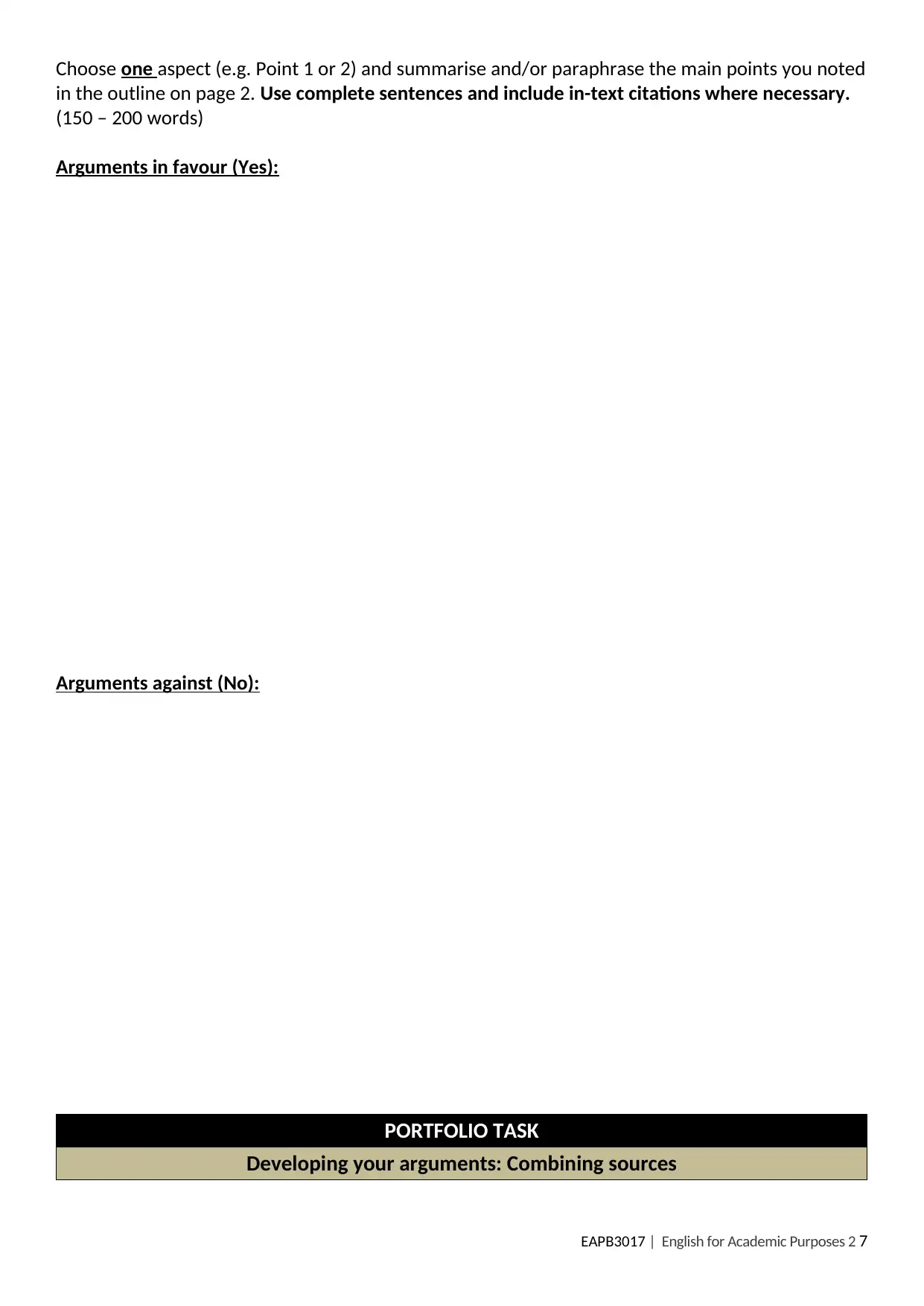
Choose one aspect (e.g. Point 1 or 2) and summarise and/or paraphrase the main points you noted
in the outline on page 2. Use complete sentences and include in-text citations where necessary.
(150 – 200 words)
Arguments in favour (Yes):
Arguments against (No):
PORTFOLIO TASK
Developing your arguments: Combining sources
EAPB3017 | English for Academic Purposes 2 7
in the outline on page 2. Use complete sentences and include in-text citations where necessary.
(150 – 200 words)
Arguments in favour (Yes):
Arguments against (No):
PORTFOLIO TASK
Developing your arguments: Combining sources
EAPB3017 | English for Academic Purposes 2 7
Paraphrase This Document
Need a fresh take? Get an instant paraphrase of this document with our AI Paraphraser
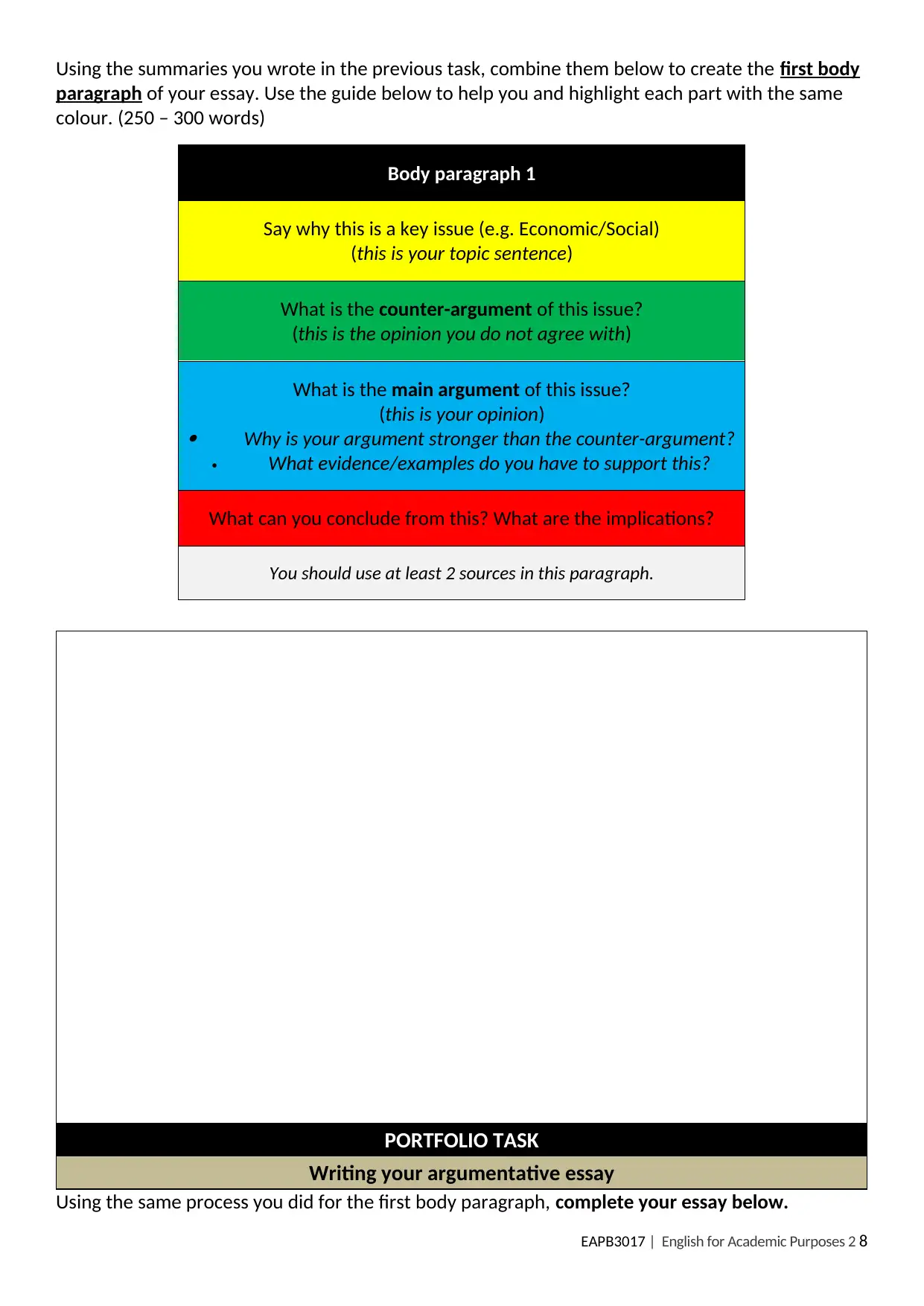
Using the summaries you wrote in the previous task, combine them below to create the first body
paragraph of your essay. Use the guide below to help you and highlight each part with the same
colour. (250 – 300 words)
Body paragraph 1
Say why this is a key issue (e.g. Economic/Social)
(this is your topic sentence)
What is the counter-argument of this issue?
(this is the opinion you do not agree with)
What is the main argument of this issue?
(this is your opinion)
Why is your argument stronger than the counter-argument?
What evidence/examples do you have to support this?
What can you conclude from this? What are the implications?
You should use at least 2 sources in this paragraph.
PORTFOLIO TASK
Writing your argumentative essay
Using the same process you did for the first body paragraph, complete your essay below.
EAPB3017 | English for Academic Purposes 2 8
paragraph of your essay. Use the guide below to help you and highlight each part with the same
colour. (250 – 300 words)
Body paragraph 1
Say why this is a key issue (e.g. Economic/Social)
(this is your topic sentence)
What is the counter-argument of this issue?
(this is the opinion you do not agree with)
What is the main argument of this issue?
(this is your opinion)
Why is your argument stronger than the counter-argument?
What evidence/examples do you have to support this?
What can you conclude from this? What are the implications?
You should use at least 2 sources in this paragraph.
PORTFOLIO TASK
Writing your argumentative essay
Using the same process you did for the first body paragraph, complete your essay below.
EAPB3017 | English for Academic Purposes 2 8
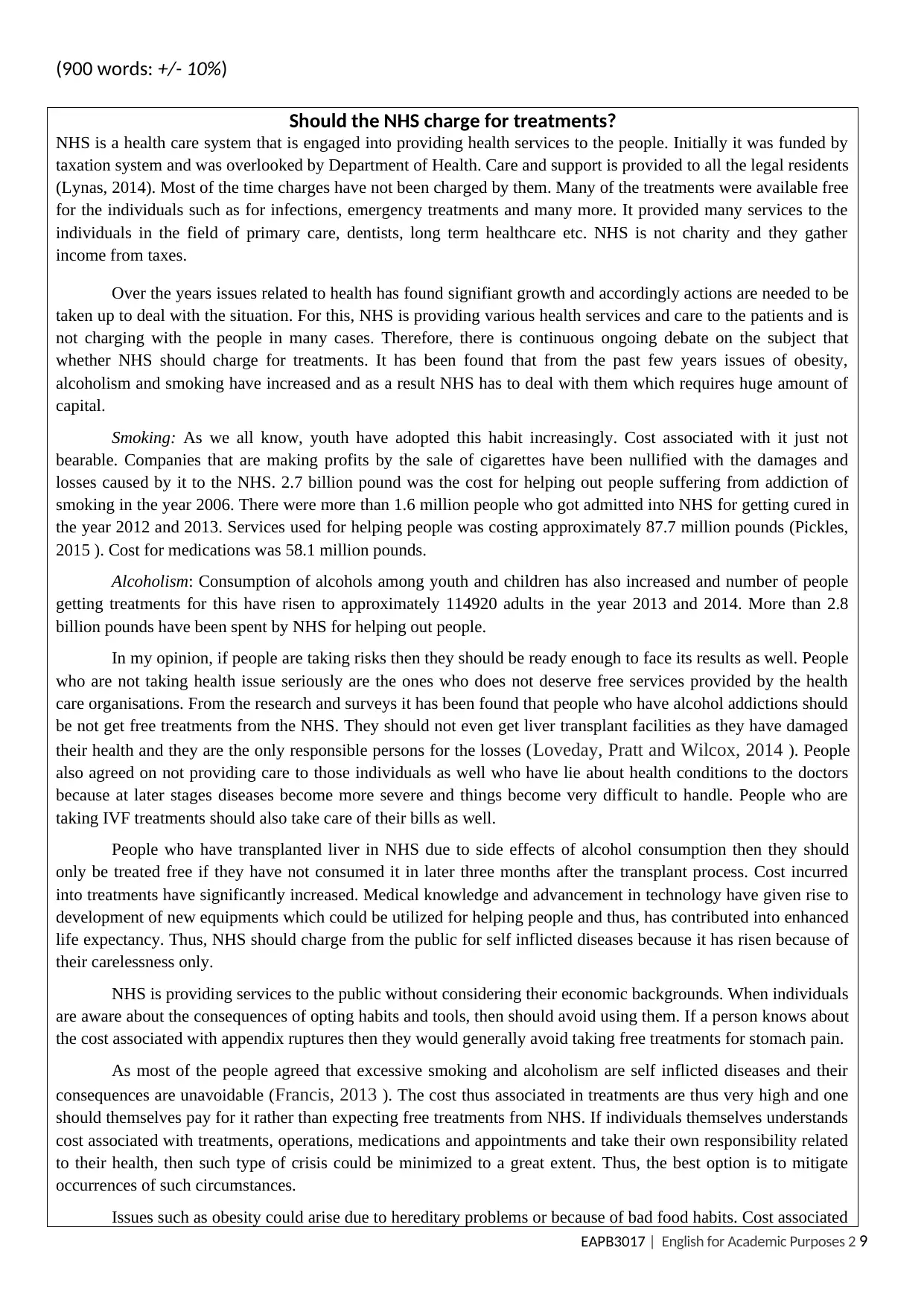
(900 words: +/- 10%)
Should the NHS charge for treatments?
NHS is a health care system that is engaged into providing health services to the people. Initially it was funded by
taxation system and was overlooked by Department of Health. Care and support is provided to all the legal residents
(Lynas, 2014). Most of the time charges have not been charged by them. Many of the treatments were available free
for the individuals such as for infections, emergency treatments and many more. It provided many services to the
individuals in the field of primary care, dentists, long term healthcare etc. NHS is not charity and they gather
income from taxes.
Over the years issues related to health has found signifiant growth and accordingly actions are needed to be
taken up to deal with the situation. For this, NHS is providing various health services and care to the patients and is
not charging with the people in many cases. Therefore, there is continuous ongoing debate on the subject that
whether NHS should charge for treatments. It has been found that from the past few years issues of obesity,
alcoholism and smoking have increased and as a result NHS has to deal with them which requires huge amount of
capital.
Smoking: As we all know, youth have adopted this habit increasingly. Cost associated with it just not
bearable. Companies that are making profits by the sale of cigarettes have been nullified with the damages and
losses caused by it to the NHS. 2.7 billion pound was the cost for helping out people suffering from addiction of
smoking in the year 2006. There were more than 1.6 million people who got admitted into NHS for getting cured in
the year 2012 and 2013. Services used for helping people was costing approximately 87.7 million pounds (Pickles,
2015 ). Cost for medications was 58.1 million pounds.
Alcoholism: Consumption of alcohols among youth and children has also increased and number of people
getting treatments for this have risen to approximately 114920 adults in the year 2013 and 2014. More than 2.8
billion pounds have been spent by NHS for helping out people.
In my opinion, if people are taking risks then they should be ready enough to face its results as well. People
who are not taking health issue seriously are the ones who does not deserve free services provided by the health
care organisations. From the research and surveys it has been found that people who have alcohol addictions should
be not get free treatments from the NHS. They should not even get liver transplant facilities as they have damaged
their health and they are the only responsible persons for the losses (Loveday, Pratt and Wilcox, 2014 ). People
also agreed on not providing care to those individuals as well who have lie about health conditions to the doctors
because at later stages diseases become more severe and things become very difficult to handle. People who are
taking IVF treatments should also take care of their bills as well.
People who have transplanted liver in NHS due to side effects of alcohol consumption then they should
only be treated free if they have not consumed it in later three months after the transplant process. Cost incurred
into treatments have significantly increased. Medical knowledge and advancement in technology have given rise to
development of new equipments which could be utilized for helping people and thus, has contributed into enhanced
life expectancy. Thus, NHS should charge from the public for self inflicted diseases because it has risen because of
their carelessness only.
NHS is providing services to the public without considering their economic backgrounds. When individuals
are aware about the consequences of opting habits and tools, then should avoid using them. If a person knows about
the cost associated with appendix ruptures then they would generally avoid taking free treatments for stomach pain.
As most of the people agreed that excessive smoking and alcoholism are self inflicted diseases and their
consequences are unavoidable (Francis, 2013 ). The cost thus associated in treatments are thus very high and one
should themselves pay for it rather than expecting free treatments from NHS. If individuals themselves understands
cost associated with treatments, operations, medications and appointments and take their own responsibility related
to their health, then such type of crisis could be minimized to a great extent. Thus, the best option is to mitigate
occurrences of such circumstances.
Issues such as obesity could arise due to hereditary problems or because of bad food habits. Cost associated
EAPB3017 | English for Academic Purposes 2 9
Should the NHS charge for treatments?
NHS is a health care system that is engaged into providing health services to the people. Initially it was funded by
taxation system and was overlooked by Department of Health. Care and support is provided to all the legal residents
(Lynas, 2014). Most of the time charges have not been charged by them. Many of the treatments were available free
for the individuals such as for infections, emergency treatments and many more. It provided many services to the
individuals in the field of primary care, dentists, long term healthcare etc. NHS is not charity and they gather
income from taxes.
Over the years issues related to health has found signifiant growth and accordingly actions are needed to be
taken up to deal with the situation. For this, NHS is providing various health services and care to the patients and is
not charging with the people in many cases. Therefore, there is continuous ongoing debate on the subject that
whether NHS should charge for treatments. It has been found that from the past few years issues of obesity,
alcoholism and smoking have increased and as a result NHS has to deal with them which requires huge amount of
capital.
Smoking: As we all know, youth have adopted this habit increasingly. Cost associated with it just not
bearable. Companies that are making profits by the sale of cigarettes have been nullified with the damages and
losses caused by it to the NHS. 2.7 billion pound was the cost for helping out people suffering from addiction of
smoking in the year 2006. There were more than 1.6 million people who got admitted into NHS for getting cured in
the year 2012 and 2013. Services used for helping people was costing approximately 87.7 million pounds (Pickles,
2015 ). Cost for medications was 58.1 million pounds.
Alcoholism: Consumption of alcohols among youth and children has also increased and number of people
getting treatments for this have risen to approximately 114920 adults in the year 2013 and 2014. More than 2.8
billion pounds have been spent by NHS for helping out people.
In my opinion, if people are taking risks then they should be ready enough to face its results as well. People
who are not taking health issue seriously are the ones who does not deserve free services provided by the health
care organisations. From the research and surveys it has been found that people who have alcohol addictions should
be not get free treatments from the NHS. They should not even get liver transplant facilities as they have damaged
their health and they are the only responsible persons for the losses (Loveday, Pratt and Wilcox, 2014 ). People
also agreed on not providing care to those individuals as well who have lie about health conditions to the doctors
because at later stages diseases become more severe and things become very difficult to handle. People who are
taking IVF treatments should also take care of their bills as well.
People who have transplanted liver in NHS due to side effects of alcohol consumption then they should
only be treated free if they have not consumed it in later three months after the transplant process. Cost incurred
into treatments have significantly increased. Medical knowledge and advancement in technology have given rise to
development of new equipments which could be utilized for helping people and thus, has contributed into enhanced
life expectancy. Thus, NHS should charge from the public for self inflicted diseases because it has risen because of
their carelessness only.
NHS is providing services to the public without considering their economic backgrounds. When individuals
are aware about the consequences of opting habits and tools, then should avoid using them. If a person knows about
the cost associated with appendix ruptures then they would generally avoid taking free treatments for stomach pain.
As most of the people agreed that excessive smoking and alcoholism are self inflicted diseases and their
consequences are unavoidable (Francis, 2013 ). The cost thus associated in treatments are thus very high and one
should themselves pay for it rather than expecting free treatments from NHS. If individuals themselves understands
cost associated with treatments, operations, medications and appointments and take their own responsibility related
to their health, then such type of crisis could be minimized to a great extent. Thus, the best option is to mitigate
occurrences of such circumstances.
Issues such as obesity could arise due to hereditary problems or because of bad food habits. Cost associated
EAPB3017 | English for Academic Purposes 2 9
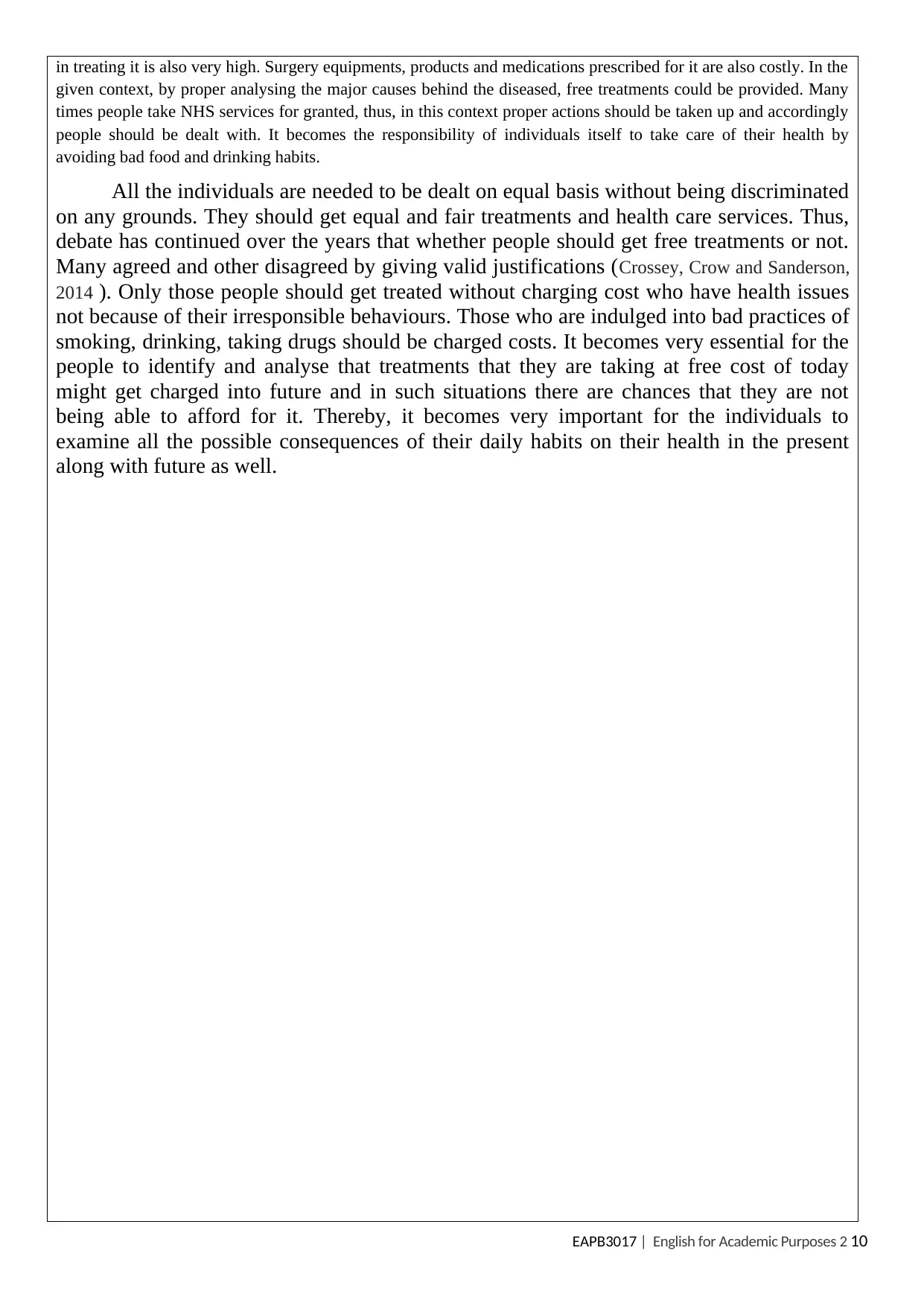
in treating it is also very high. Surgery equipments, products and medications prescribed for it are also costly. In the
given context, by proper analysing the major causes behind the diseased, free treatments could be provided. Many
times people take NHS services for granted, thus, in this context proper actions should be taken up and accordingly
people should be dealt with. It becomes the responsibility of individuals itself to take care of their health by
avoiding bad food and drinking habits.
All the individuals are needed to be dealt on equal basis without being discriminated
on any grounds. They should get equal and fair treatments and health care services. Thus,
debate has continued over the years that whether people should get free treatments or not.
Many agreed and other disagreed by giving valid justifications (Crossey, Crow and Sanderson,
2014 ). Only those people should get treated without charging cost who have health issues
not because of their irresponsible behaviours. Those who are indulged into bad practices of
smoking, drinking, taking drugs should be charged costs. It becomes very essential for the
people to identify and analyse that treatments that they are taking at free cost of today
might get charged into future and in such situations there are chances that they are not
being able to afford for it. Thereby, it becomes very important for the individuals to
examine all the possible consequences of their daily habits on their health in the present
along with future as well.
EAPB3017 | English for Academic Purposes 2 10
given context, by proper analysing the major causes behind the diseased, free treatments could be provided. Many
times people take NHS services for granted, thus, in this context proper actions should be taken up and accordingly
people should be dealt with. It becomes the responsibility of individuals itself to take care of their health by
avoiding bad food and drinking habits.
All the individuals are needed to be dealt on equal basis without being discriminated
on any grounds. They should get equal and fair treatments and health care services. Thus,
debate has continued over the years that whether people should get free treatments or not.
Many agreed and other disagreed by giving valid justifications (Crossey, Crow and Sanderson,
2014 ). Only those people should get treated without charging cost who have health issues
not because of their irresponsible behaviours. Those who are indulged into bad practices of
smoking, drinking, taking drugs should be charged costs. It becomes very essential for the
people to identify and analyse that treatments that they are taking at free cost of today
might get charged into future and in such situations there are chances that they are not
being able to afford for it. Thereby, it becomes very important for the individuals to
examine all the possible consequences of their daily habits on their health in the present
along with future as well.
EAPB3017 | English for Academic Purposes 2 10
Secure Best Marks with AI Grader
Need help grading? Try our AI Grader for instant feedback on your assignments.
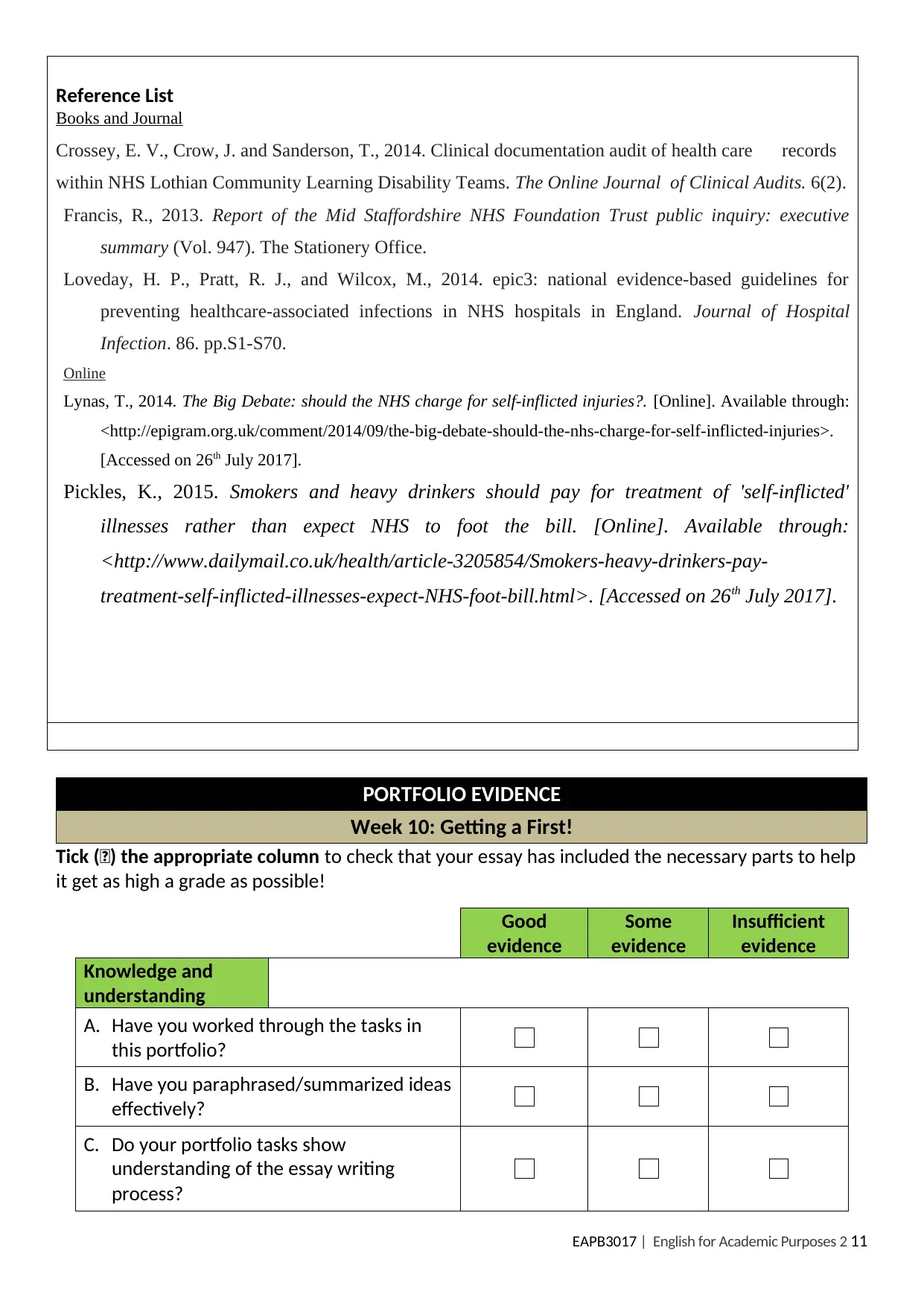
Reference List
Books and Journal
Crossey, E. V., Crow, J. and Sanderson, T., 2014. Clinical documentation audit of health care records
within NHS Lothian Community Learning Disability Teams. The Online Journal of Clinical Audits. 6(2).
Francis, R., 2013. Report of the Mid Staffordshire NHS Foundation Trust public inquiry: executive
summary (Vol. 947). The Stationery Office.
Loveday, H. P., Pratt, R. J., and Wilcox, M., 2014. epic3: national evidence-based guidelines for
preventing healthcare-associated infections in NHS hospitals in England. Journal of Hospital
Infection. 86. pp.S1-S70.
Online
Lynas, T., 2014. The Big Debate: should the NHS charge for self-inflicted injuries?. [Online]. Available through:
<http://epigram.org.uk/comment/2014/09/the-big-debate-should-the-nhs-charge-for-self-inflicted-injuries>.
[Accessed on 26th July 2017].
Pickles, K., 2015. Smokers and heavy drinkers should pay for treatment of 'self-inflicted'
illnesses rather than expect NHS to foot the bill. [Online]. Available through:
<http://www.dailymail.co.uk/health/article-3205854/Smokers-heavy-drinkers-pay-
treatment-self-inflicted-illnesses-expect-NHS-foot-bill.html>. [Accessed on 26th July 2017].
PORTFOLIO EVIDENCE
Week 10: Getting a First!
Tick () the appropriate column to check that your essay has included the necessary parts to help
it get as high a grade as possible!
Good
evidence
Some
evidence
Insufficient
evidence
Knowledge and
understanding
A. Have you worked through the tasks in
this portfolio?
B. Have you paraphrased/summarized ideas
effectively?
C. Do your portfolio tasks show
understanding of the essay writing
process?
EAPB3017 | English for Academic Purposes 2 11
Books and Journal
Crossey, E. V., Crow, J. and Sanderson, T., 2014. Clinical documentation audit of health care records
within NHS Lothian Community Learning Disability Teams. The Online Journal of Clinical Audits. 6(2).
Francis, R., 2013. Report of the Mid Staffordshire NHS Foundation Trust public inquiry: executive
summary (Vol. 947). The Stationery Office.
Loveday, H. P., Pratt, R. J., and Wilcox, M., 2014. epic3: national evidence-based guidelines for
preventing healthcare-associated infections in NHS hospitals in England. Journal of Hospital
Infection. 86. pp.S1-S70.
Online
Lynas, T., 2014. The Big Debate: should the NHS charge for self-inflicted injuries?. [Online]. Available through:
<http://epigram.org.uk/comment/2014/09/the-big-debate-should-the-nhs-charge-for-self-inflicted-injuries>.
[Accessed on 26th July 2017].
Pickles, K., 2015. Smokers and heavy drinkers should pay for treatment of 'self-inflicted'
illnesses rather than expect NHS to foot the bill. [Online]. Available through:
<http://www.dailymail.co.uk/health/article-3205854/Smokers-heavy-drinkers-pay-
treatment-self-inflicted-illnesses-expect-NHS-foot-bill.html>. [Accessed on 26th July 2017].
PORTFOLIO EVIDENCE
Week 10: Getting a First!
Tick () the appropriate column to check that your essay has included the necessary parts to help
it get as high a grade as possible!
Good
evidence
Some
evidence
Insufficient
evidence
Knowledge and
understanding
A. Have you worked through the tasks in
this portfolio?
B. Have you paraphrased/summarized ideas
effectively?
C. Do your portfolio tasks show
understanding of the essay writing
process?
EAPB3017 | English for Academic Purposes 2 11
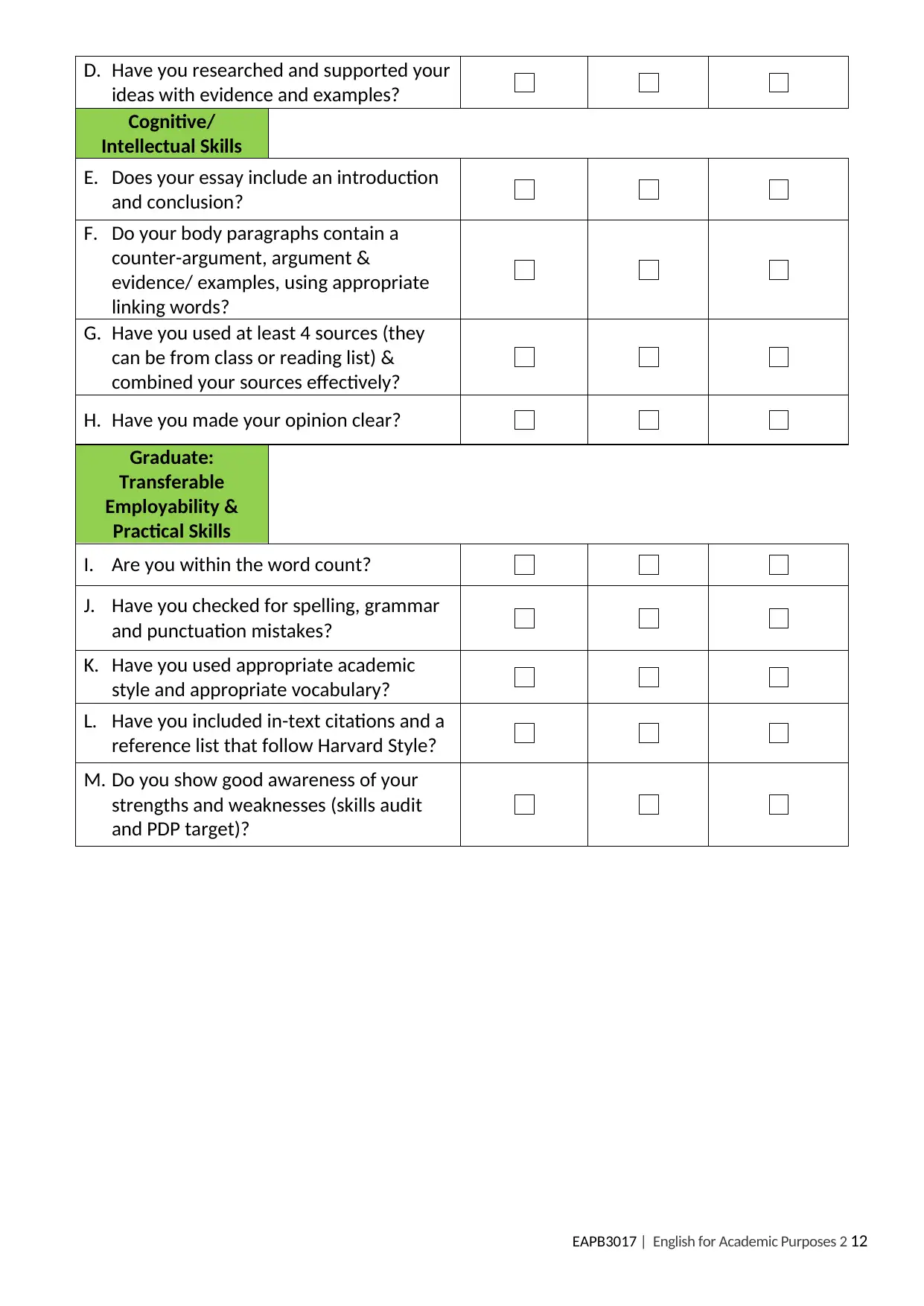
D. Have you researched and supported your
ideas with evidence and examples?
Cognitive/
Intellectual Skills
E. Does your essay include an introduction
and conclusion?
F. Do your body paragraphs contain a
counter-argument, argument &
evidence/ examples, using appropriate
linking words?
G. Have you used at least 4 sources (they
can be from class or reading list) &
combined your sources effectively?
H. Have you made your opinion clear?
Graduate:
Transferable
Employability &
Practical Skills
I. Are you within the word count?
J. Have you checked for spelling, grammar
and punctuation mistakes?
K. Have you used appropriate academic
style and appropriate vocabulary?
L. Have you included in-text citations and a
reference list that follow Harvard Style?
M. Do you show good awareness of your
strengths and weaknesses (skills audit
and PDP target)?
EAPB3017 | English for Academic Purposes 2 12
ideas with evidence and examples?
Cognitive/
Intellectual Skills
E. Does your essay include an introduction
and conclusion?
F. Do your body paragraphs contain a
counter-argument, argument &
evidence/ examples, using appropriate
linking words?
G. Have you used at least 4 sources (they
can be from class or reading list) &
combined your sources effectively?
H. Have you made your opinion clear?
Graduate:
Transferable
Employability &
Practical Skills
I. Are you within the word count?
J. Have you checked for spelling, grammar
and punctuation mistakes?
K. Have you used appropriate academic
style and appropriate vocabulary?
L. Have you included in-text citations and a
reference list that follow Harvard Style?
M. Do you show good awareness of your
strengths and weaknesses (skills audit
and PDP target)?
EAPB3017 | English for Academic Purposes 2 12
1 out of 12
Related Documents
Your All-in-One AI-Powered Toolkit for Academic Success.
+13062052269
info@desklib.com
Available 24*7 on WhatsApp / Email
![[object Object]](/_next/static/media/star-bottom.7253800d.svg)
Unlock your academic potential
© 2024 | Zucol Services PVT LTD | All rights reserved.





